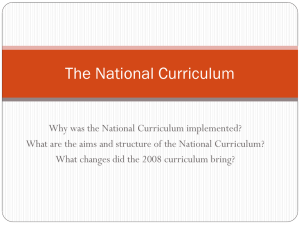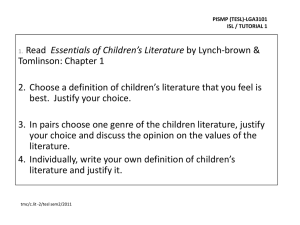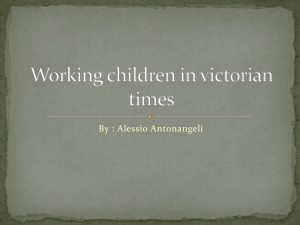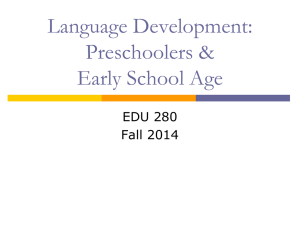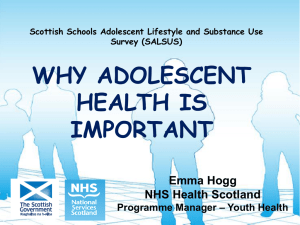Parents Workshop (Internet Safety)
advertisement
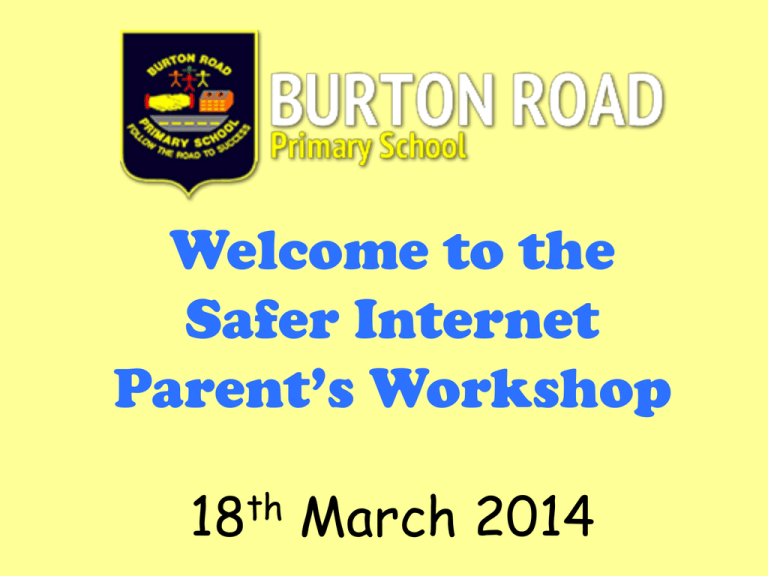
Welcome to the Safer Internet Parent’s Workshop th 18 March 2014 93% of all 5-15 year olds used the internet in 2013. This is four in five 5-7 year olds (82%), nearly all 8-11 year olds (96%) and 12-15 year olds (99%). Source: Ofcom (2013) Children and parents: media use and attitudes report. London: Ofcom. The estimated weekly volume of internet use at home in 2013: 6.5 hours for 3-4 year olds 6.7 hours for 5-7 year olds 9.2 hours for 8-11 year olds 17.0 hours for 12-15 year olds Source: Ofcom (2013) Children and parents: media use and attitudes report London: Ofcom. Children are now accessing technology from an early age. The new iPotty and iStroller are now available. What are your thoughts? Children are now accessing technology from an early age. Apptivity gyms. Do your children know what to do if they see something on the Internet that makes them uncomfortable? 13% of UK 9-16 year olds said they had been bothered or upset by something online in the past year 35% of children aged 5-15 years old who use the internet at home have an active social networking site profile. 1% of 5-7 year olds 18% of 8-11 year olds 67% of 12-15 year olds 22% of 8-12 year olds who use the internet at home say they have a profile on Facebook, Bebo or MySpace (despite the minimum age at which you can have a profile on these sites being 13) Source: Ofcom (2013) Children and parents: media use and attitudes report. London: Ofcom In our school the most popular social networking sites are: Facebook xBox Live Instagram Snapchat Twitter WhatsApp Skype Kik Binweevils Bebo Is your child signed up to any of these sites? Do you know what they involve and the age limit they recommend? These are rules set out by Facebook: Registration and Account Security Facebook users provide their real names and information, and we need your help to keep it that way. Here are some commitments you make to us relating to registering and maintaining the security of your account: • You will not use Facebook if you are under 13. Snapchat is directed towards teens and adults. Minors ages 13-17 should have permission from a parent or legal guardian before using Snapchat. Children under the age of 13 are only permitted to access a special version of Snapchat, called “SnapKidz,” which they are automatically directed to upon sign up. Instagram does not knowingly collect or solicit any information from anyone under the age of 13 or knowingly allow such persons to register for the Service. The Service and its content are not directed at children under the age of 13. In the event that we learn that we have collected personal information from a child under age 13 without parental consent, we will delete that information as quickly as possible. Children are able to access the Internet anywhere, anytime which is a huge problem. Computers and laptops should be placed in communal areas of the house so that content can be monitored. However, mobile devices also have access to the internet which makes it a lot harder to keep a track of what your children are doing and if there are problems it is harder to get away from. Games consoles and televisions have access to the internet which may make it difficult to realise that children are playing or talking to others. 12-15 year olds have an average of 272 social networking friends Children aged 12-15 years old estimate that they have not met one in three of their social networking friends (29%) Most children aged 8-12 years old and 12-15 years old with an active social networking profile say that their profile can be seen only by their friends (79% for 8-12 year olds), while 6% of 8-12s say their profiles can be seen by anyone. 29% of UK children aged 9-16 years old said they had contact online with someone they have not met face to face 4% of UK 9-16 year olds have gone to an offline meeting with someone they first met online. Source: Haddon, L.; Livingstone, S.; and EU Kids Online Network (2012) EU Kids Online: national perspectives London: The London School of Economics and Political Science There are many issues associated with this. •Cost of apps (if the child is on a contract) •Age appropriate content •Viruses Text messaging and chat abbreviations have had a detrimental effect on the punctuation and grammar of children in schools. This language is used in IM (chat), text messaging, emails and status updates and children are beginning to transfer this language into their writing as it is hard to separate the two. The idea of these is to write ideas down as quickly and in a shortened form whereas in school we ask children to extend their sentences and add in detail. These are the SMART rules we use in school. How to set up parental controls for BT, Sky, Talk Talk and Virgin Media Parents Guide from Think U Know
